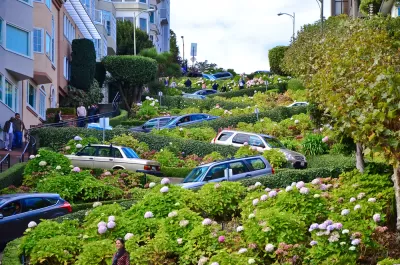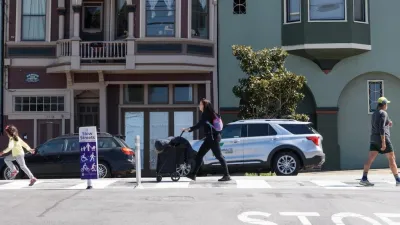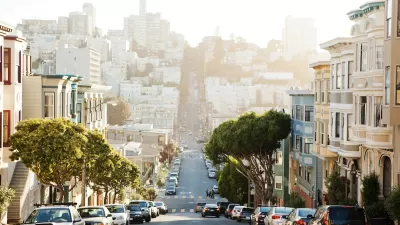San Francisco is looking for ways to manage—and protect—the masses of tourists who want to walk "the World's Crookedest Street."

In the residential Russian Hill neighborhood of San Francisco, one block draws an estimated 2 million pedestrians a year—the famously steep, winding stretch of Lombard Street.
In response to complaints from residents about traffic, noise, litter, and petty crime, the County Transportation Authority is studying ways to manage the crowds, SF Gate reports. After a year researching how other tourist destinations handle similar problems, the study is now exploring solutions—including barring cars and turning the area into a pedestrian-only plaza.
Other proposals include hiring a mass of parking and safety officers, requiring reservations, and charging a toll. Some tourists told the paper they would be willing to pay an admission fee, while at least one said pedestrians should visit for free and separately from cars.
FULL STORY: Turn for the worse on SF’s famous Lombard Street

Montreal Mall to Become 6,000 Housing Units
Place Versailles will be transformed into a mixed-use complex over the next 25 years.

Planetizen Federal Action Tracker
A weekly monitor of how Trump’s orders and actions are impacting planners and planning in America.

Four Reasons Urban Planners Can’t Ignore AI
It’s no longer a question of whether AI will shape planning, but how. That how is up to us.

Bend, Deschutes County Move to Restrict Major Homeless Encampment
City and county officials are closing off portions of an area known as Juniper Ridge where many unhoused residents find shelter, hoping to direct people to housing and supportive services.

High Housing Costs Driving Down Transit Ridership in LA
When neighborhoods gentrify and displace lower-income residents, transit ridership suffers, new research shows.

Iowa Legalizes Accessory Dwelling Units
A new law will allow property owners to build ADUs on single-family lots starting on July 1.
Urban Design for Planners 1: Software Tools
This six-course series explores essential urban design concepts using open source software and equips planners with the tools they need to participate fully in the urban design process.
Planning for Universal Design
Learn the tools for implementing Universal Design in planning regulations.
City of Mt Shasta
City of Camden Redevelopment Agency
City of Astoria
Transportation Research & Education Center (TREC) at Portland State University
City of Camden Redevelopment Agency
Municipality of Princeton (NJ)
Regional Transportation Commission of Southern Nevada





























